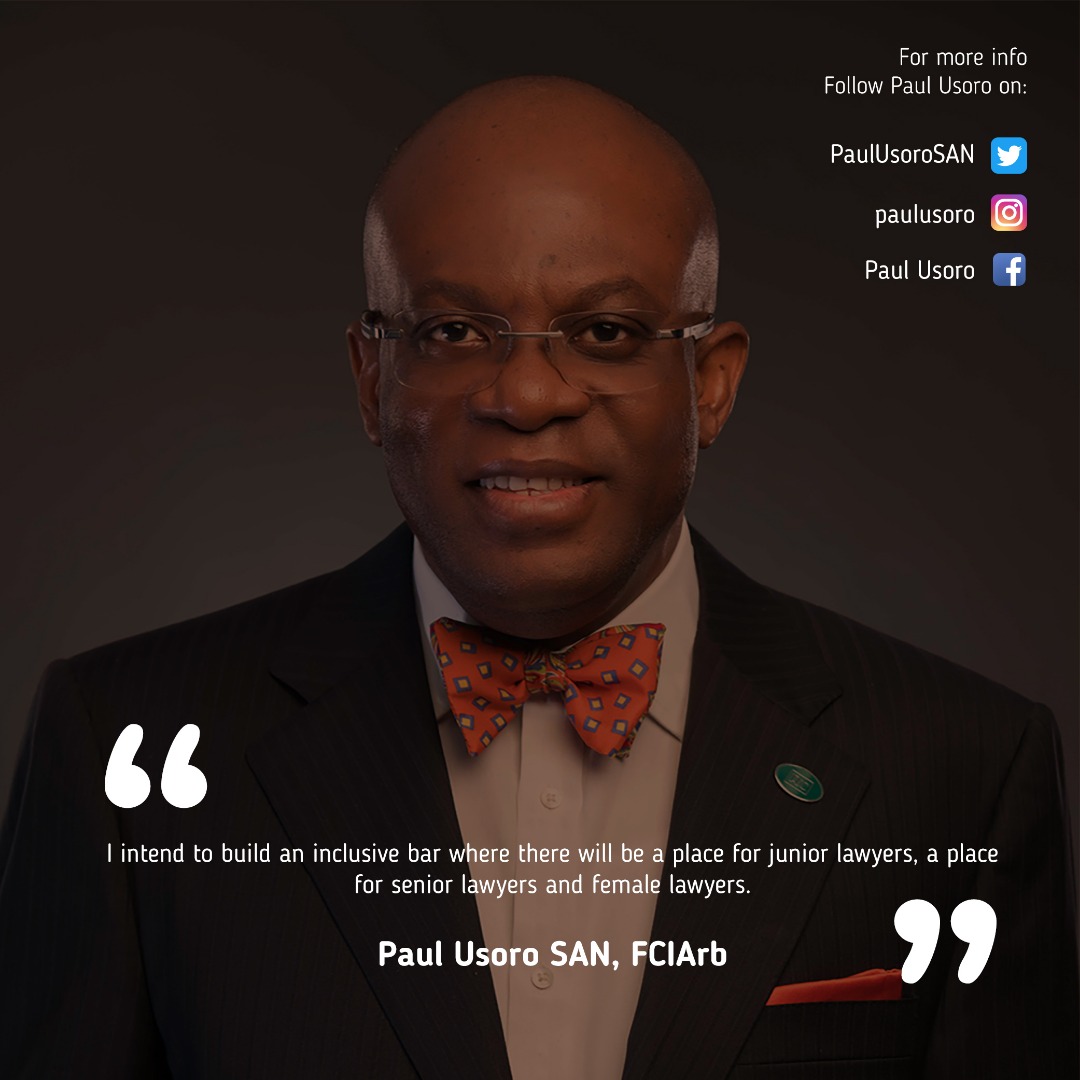Paul Usoro is one of Nigeria’s leading lawyers, with industry-leading expertise in commercial and telecommunications law. In the second of a series of articles, he tackles the issue of welfare for young practitioners in the legal profession, the structural problems fuelling it and sets out a range of proposals the Nigerian Bar Association should consider in order to alter the status quo.
Contributing Factors (I): Contracting Market for Legal Services
It is axiomatic that one cannot give what he does not possess or have. Ironically, most lawyers only apply that saying to intellectual matters forgetting or ignoring the fact that it applies just as well to economic circumstances. The senior lawyer or firm that is earning little cannot afford to pay their younger colleagues any reasonable income. Why do some lawyers and firms earn such poor income? Several factors account for this and one of these is the contracting size of the Nigerian legal services market. This contraction which has insidiously been creeping in on us over the years is caused, in part, by the unceasing, widespread and unregulated encroachment into the Nigerian legal services market by Nigerian non-lawyers as well as foreign lawyers and law firms.
At the very base level, the level which affects most lawyers whether, in the urban or rural branches, there is, illustratively, a serious and persistent encroachment by non-lawyers and touts into the legal services market as it relates to land transactions, to the detriment and disadvantage of lawyers. Lawyers in literally all branches of the NBA, both cosmopolitan and provincial branches (a term that was generously donated recently to me by the Okitipupa NBA Branch), feel the impact and brunt of and lament these encroachments. At the upscale level, in-house counsel positions in multinational companies are increasingly being taken over and occupied by foreign lawyers who have not been called to the Nigerian Bar and are not licensed to practice or offer legal services in Nigeria.
READ MORE: Paul Usoro: Reflections on the welfare of young lawyers and related issues
Foreign law firms are also increasingly taking over a disproportionate share of the Nigerian legal transaction market, with the active connivance of governments, at the federal level mostly and sometimes at the States levels, and also with the complicity of some of our colleagues. In some instances, governments are, perhaps, unwitting accomplices, and this occurs mostly when multilateral credits or aids are taken from foreign donors and/or agencies with the collateral conditionality which requires the engagement of donor country consultants and foreign law firms to manage the transaction, ostensibly because Nigerian lawyers, as we hear so often, are not experienced, have never handled such transactions, do not have the discipline to handle such transactions and cannot be trusted to handle them. In some other instances, government officials, with the support of some of us, boldly pronounce, even without prompting from those multi-lateral agencies and donors that they, the government officials, find Nigerian lawyers unfit and totally inexperienced and undisciplined to handle certain transactions.
I have always found these excuses by Nigerian governments and their officials totally inexplicable and untenable and indeed insulting to and demeaning of the intellect and capabilities of Nigerian lawyers and it is rather unfortunate that some of us join in mouthing and condoning these feckless excuses. Happily, and thanks in part to Awolowo v The Hon Mallam Usman Sarki & another (1966) LPELR-25290 (SC), these excuses are not applied to court litigation matters and this is rather ironic. Ironic in the sense that Nigerian lawyers who can be trusted to argue matters in court, no matter how recondite or novel, cannot be trusted by their governments and some private sector organisations and individuals to handle novel/recondite and/or complicated transactions. How will the Nigerian lawyers gain experience when they are so excluded from those transactions and in instances where they are not totally excluded or banished, and are fed crumbs and assigned low-level reviews of the Nigerian law portions of the deal by the foreign lawyers and their firms, with the active connivance of Nigerian governments, organizations and persons?
Just before leaving the issue of court litigation, I must mention that a multinational company operating in Nigeria, about a year or two ago, engaged a foreign counsel to negotiate an out-of-court settlement with the Nigerian government in a matter that was then pending in court. That may perhaps have signalled a creeping encroachment even into the court litigation arena by foreign lawyers and firms which, if left unchecked and not nipped in the bud, could blossom into a full-blown incursion similar to what we’re experiencing in transactions. In the broader dispute resolution arena, there are unchecked incursions by foreign law firms and lawyers notably in arbitration matters. I am aware of instances where parties to arbitral proceedings that are conducted in Nigeria engage foreign counsel to represent them in those proceedings, matters that Nigerian counsel are very capable of handling.
I do not believe that there is any aspect of legal services, including transaction and arbitral matters, that we cannot find capable Nigerian lawyers to handle. I also believe that, if we must involve foreign counsel in the delivery of legal services in Nigeria, there must be an open dialogue and negotiations led by the NBA and our Attorney-General of the Federation/Trade Ministry with relevant foreign bar associations and their countries’ trade negotiators. This is standard practice in developed and developing countries where bar associations work with trade ministries in market access negotiations as it relates to legal services. A limited access principle whereby foreign lawyers must be led by Nigerian lawyers, the Nigerian lawyers being the ones to nominate, agree with and assign portions of the assignment to the foreign lawyers and firms, could be put on the table in such negotiations.
Incidentally, I speak from well-heeled and vindicated experience. At the time of the first Nigerian international spectrum auction which ushered GSM services into Nigeria in 2000, the same arguments of novel and recondite transactions were raised against my engagement as the counsel for the transaction, but thank heavens and the strong-will of the board and executive management of the Nigerian Communications Commission (“NCC”) that was led respectively by Alhaji Ahmed Joda and Engr Ernest Ndukwe, OFR, I was retained for the assignment and I turned out to be the only lawyer in the 5-man Auction Control Team that conducted the spectrum auction which remains a landmark Nigerian transaction and the template for subsequent such transactions beyond Nigeria. The license and other transaction documents and framework which I prepared then, in conjunction with NCC in-house Counsel, all Nigerians, including Michael Ikpoki who later joined MTN and rose to become its first and only Nigerian Managing Director, Osondu Nwokoro, currently the Legal Director of MNTel and Josephine Amuwa, currently a director at the NCC, remains, up till date, the model and template for such transactions. Not even our then detractors and traducers could find a fault in them.
Exactly the same scenario played out when we had the responsibility for preparing the Nigerian Communications Act, 2003 – the subsisting regulatory framework for the Nigerian communications industry. Naysayers rose and claimed, at the time, that no Nigerian lawyer had the experience or skill to prepare such a landmark legislation; they indeed they went as far as hiring foreign firms who prepared drafts of the legislation for them. Again, we worked with the same set of NCC in-house Counsel that I mentioned earlier who worked with me and defeated them solely because we produced a far superior and unsurpassable legislation, entirely and wholly Nigerian-made! As at date, almost 15 years after the passage of that Act, no fault has been found in the legislation and no amendment has been made thereto.
To summarise, I propose that the NBA intervene to protect the Nigerian legal services market for Nigerian lawyers by pushing back on the encroachment of the market by non-lawyers and foreign lawyers and law firms – both at the base and upscale levels. Every land transaction that is handled by a non-lawyer results in loss of income to the Nigerian lawyer. Each legal position that is occupied in multinational organisations by foreign lawyers amounts to a lost opportunity and a loss of income for the Nigerian lawyers; ditto in respect of Nigerian transactions, particularly Nigerian-financed transactions that are handled by foreign law firms and also arbitral proceedings that are conducted in Nigeria. Of course, I am aware of the globalisation of services and our commitments to the World Trade Organization, but then these commitments and the globalisation trends should be domestically regulated in a manner that does not prejudice and marginalise the Nigerian lawyers in the way that they are currently totally prejudiced, marginalised and excluded. Incidentally, we would not be the only ones to have such domestic regulations in place; in developed and other developing countries, there are such regulations which, to varying degrees, regulate the influx of foreign lawyers and firms into their respective domestic markets. By championing such protective measures, the NBA would in some ways, be guaranteeing decent income and opportunities not to mention skills development, not only for young Nigerian lawyers but for Nigerian lawyers generally.
It may also serve us well for the NBA to actively develop, maintain and constantly update at its National Secretariat, a verifiable database of Nigerian lawyers who have specialised knowledge and skills in various areas of law, either through practice or by education. Such a database would come in handy not only to blunt the constant put-down by Nigerian governments and their officials against Nigerian lawyers but also to positively assist such government agencies and the organised private sector in identifying skilled lawyers that could assist them in handling these so-called complex and “novel” transactions and matters.








Leave a Comment
You must be logged in to post a comment.